Getting my first credit card was a very exciting moment. I finally got to start building credit and take advantage of some pretty cool rewards. Business credit cards can be even more exciting. Since credit card issuers typically assume you’ll be spending more on a business credit card the rewards tend to be a bit sweeter. However, business credit cards typically have more implications (both positive and negative) than personal ones.
When deciding if a business credit card is right for you it’s important to evaluate your current needs. Typically freelancers and small businesses are a bit shy to use these cards as they run much smaller operations. If you’re a freelancer here’s what you need to know about business credit cards.
Table of Contents
ToggleBenefits of a Business Credit Card
Expense Management: When operating a business it’s important to distinguish a clear separation between your personal and business finances. A business credit card is a great way to make that distinction. Additionally it will make it easier to manage your business expenses since they’ll all be in one account.
Tax Preparation: If you use a business credit card for all your business expenses it’s really easily to calculate tax deductions and other relevant statements come tax season.
Multiple Cards: If you often use additional contractors or partners on jobs you can give them access to the companies funds through a business credit card. You can even get a card in their name so you can keep track of who spends what.
Build Business Credit: Building business credit will help you apply for better interest rate loans and open many doors when it comes to lending.
Potential Problems with a Business Credit Card
Less Protection: When using a personal credit card most card issuers will offer purchase protection. Purchase protection helps consumers dispute fraudulent activity/charges, return purchased goods, correct billing mistakes, and much more. Business credit cards often have less protection and put more liability on the business.
Expensive: If you’re looking to use a business credit card to finance your business it can get very expensive. These cards typically have higher interest rates and late fees. Additionally most cards charge an annual fee just for having the account open.
Security: If you work with a few contractors and or partners then you’ll likely have multiple cards floating around. This increases the risk of fraudulent charges or stolen card information. As the business owner or primary card holder it’s your responsibility to monitor each sub-account.
What to Look For When Applying for Your Card
If you’ve decided a business credit card is right for you here are a few things to look out for when asking around.
Annual Percentage Rate (APR): Your APR is the interest rate you’ll have to pay if you don’t pay off your balance in full. If you can, always try to setup automatic payments so you can pay off your balance in full each month.
Annual Fees: As mentioned above, most business cards will charge you an annual fee. Depending on how much you’re planning to spend, the rewards may not outweigh the cost of that fee. Card issuers assume you’ll be spending much more on a business card so they justify higher annual fees.
Intro vs. Actual Rate: Many card issuers will give you a low APR as an intro rate to close the deal. Then they’ll raise the rate after the first year. Make sure you have a clear understand of the APR and terms over an extended period of time.
Foreign Transaction Fees: If you travel all over the world to do business you’ll want to look for a card with no foreign transaction fees.
Rewards: When choosing a card make sure you pick one that complements your projected expenses. For example, if you’ll be spending in a lower tier then you should pick a lower tier card. Waving around a flashy American Express may look cool but it’ll eat into your bottom line if you aren’t careful.
Final Thoughts
As a freelancer it’s tough to know whether or not a business credit card is right for you. It really comes down to how much you’re trying to grow your freelance business.
Some like freelancing as a part-time gig they can pursue to make some extra cash. Others like to make it their full-time jobs as they are constantly pursuing new clients and channels.
If you’re still deciding make sure you reference this article to weigh the pros and cons.












